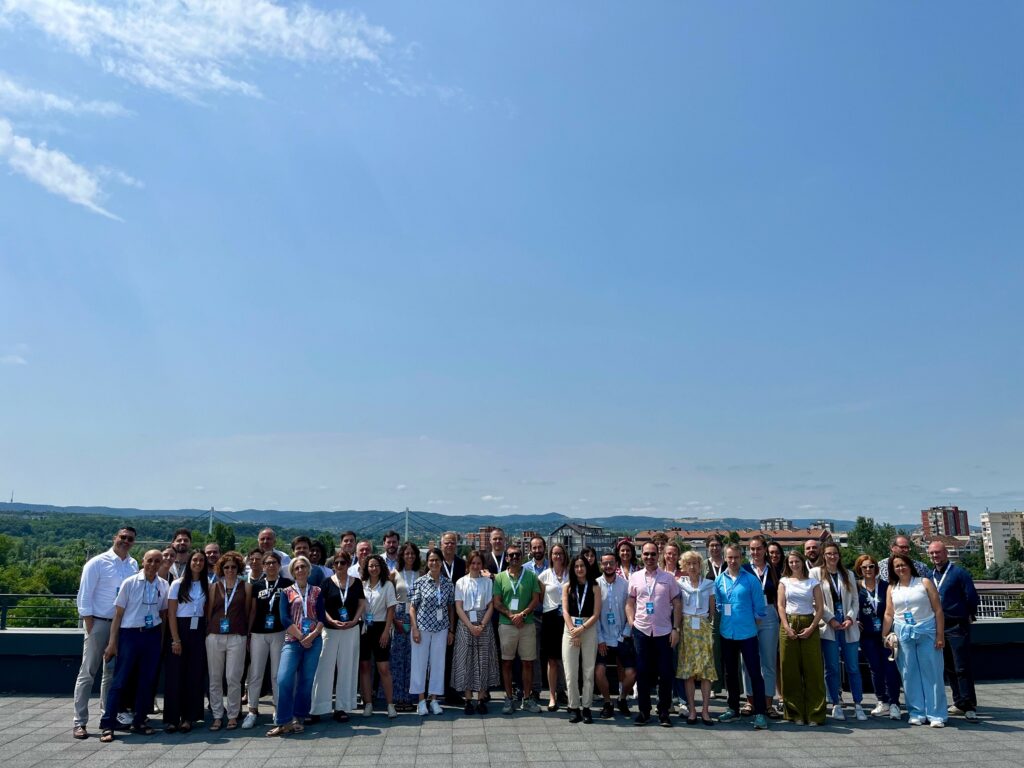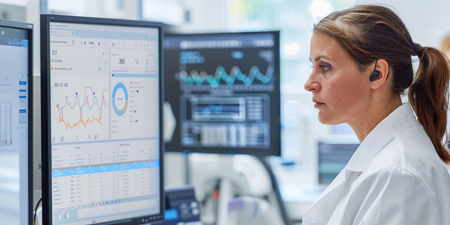Artificial Intelligence
ITCL Technology Center has a specialized R&D Unit in Artificial Intelligence, focused on developing intelligent, scalable, and tailored solutions for the most demanding digital and industrial environments. This unit works closely with both large companies and SMEs to design and implement AI-based systems and solutions capable of optimizing industrial processes, enhancing decision-making, and turning data into valuable knowledge.
Our work focuses on the design, training, and implementation of artificial intelligence models, including techniques such as Machine Learning, Deep Learning, and Natural Language Processing, applied to real-world contexts like industry, energy, mobility, and healthcare, among others. These solutions are developed under principles of precision, efficiency, and adaptability, ensuring smooth integration into complex business ecosystems.
The unit develops systems capable of analyzing large volumes of data in real time, detecting patterns, predicting behaviors, and automating complex tasks—generating sustainable competitive advantages for our clients. We also apply best practices in the development of responsible AI, ensuring transparency, explainability, and ethics in automated processes.
Our experience in R&D and process improvement projects spans regional, national, and international environments, collaborating with companies that see artificial intelligence as a strategic lever for their digital transformation and evolution toward advanced and intelligent production models.
Additionally, through our R&D work in AI Agents, we apply Generative AI technologies such as Large Language Models (LLMs)—for example, GPT, Claude, LLAMA, or DeepSeek—multimodal models, and reasoning models to build AI Agents capable of automating various processes and tasks.
These systems use human language-based reasoning to understand and break down assigned tasks. To solve them, they can perform contextual searches in files, texts, or directly on the web. They can also interact with their environment using tools to test hypotheses and developments. All these interactions are performed autonomously or semi-autonomously under human supervision.
AI Agents offer a new opportunity to automatically solve complex tasks that, until recently, could only be carried out by humans. Unlike traditional process automation, AI Agents are adaptive and flexible in complex and dynamic environments.
This R&D Unit also researches the optimization of reasoning processes, the adaptation of AI Agents to specific cases, context and information management, as well as the development of multimodal architectures.
CAPABILITIES IN ARTIFICIAL INTELLIGENCE
Modeling and Algorithm Development
SNN
Brain, a platform for creating energy consumption and generation prediction models using DL architectures based on convolutional networks + LSTM.
Cicero, systematic research of DL models for malware classification using features extracted from memory dumps. Application of XAI (Explainable AI) to understand the features most relevant to the models
Edge, Fog y Cloud
- Design and selection of tools across all processing layers.
- Selection and use of the most appropriate databases (SQL and NoSQL: Cassandra, Postgres, FHIR, Azure Data Lake, etc.) for cloud or on-premise environments.
- Development of client-server systems and communication tools (Kafka, MQTT).
- Tools and programming languages: Jupyter, R Studio, Python, R, Java, C, C++, C#.
- Applications: Data collection from multiple sensors, decision-making across multiple devices and levels.
Schedulers and Optimizers
- Definition and design of systems tailored to specific requirements and specifications.
- Development of custom algorithms for specific use conditions.
- Web deployment of constraint-based schedulers allowing user interaction and real-time changes.
- Integration with multiple databases.
- Applications: Scheduling of medical appointments, process optimization under constraints like size, staff availability, etc.
Sales Forecasting
- Selection of the target prediction variables.
- Identification of the most suitable time series algorithm and the most accurate forecasting periods.
- Development and deployment of the algorithms in real-world environments.
- Applications: Production and stock forecasting in factories. Pattern detection in online purchasing behavior.
RPA (Robotic Process Automation):
- RPA systems for process automation and web scraping using Python and R.
- XPath identification and use of UIPath.
- Applications: Web scraping for administration, insurance, external websites, e-commerce, etc.
Integration of AI into industrial PLCs
- Design of predictive algorithms deployed at the edge in industrial environments and industrial PLC devices.
- Development of custom algorithms tailored to specific usage conditions.
- Algorithm development on Beckhoff PLC systems using Beckhoff ML and Beckhoff Vision tools.
- Data transmission and report generation.
- Applications: Anomalous pattern control systems in machines, enhancing tool protection in production plants.
Rack GPU
- Definition, design, and implementation of a GPU-accelerated computing system in rack configuration, with operational standards and scalability aligned with data center-level infrastructure.
- Advice on hardware components and platforms for project deployment across different sectors.
- Integration with interactive development environments such as JupyterLab and Visual Studio Code, allowing seamless workflows for development, training, and GPU-based model deployment.
- Deployment of Docker containers with preconfigured environments for testing.
- Applications: GPU rack systems accessible to multiple models.
CAPABILITIES IN AI AGENTS
ChatBots
Creation, configuration, customization, and deployment of conversational agents using written language, powered by LLM models. This AI technology enables assistance with specific tasks and queries in natural language. We focus on improving the quality, fluency, and factual accuracy of the chatbot’s responses. It is always advisable to implement “guardrails” to ensure the ChatBot only engages in conversations related to its intended topics and objectives.
SpeechBots
Like ChatBots, these agents assist users in a conversational manner. Unlike ChatBots, which use written text to communicate, SpeechBots use spoken language. They are capable of understanding user voice input and responding with synthetic speech. This is achieved through specific modules that convert voice to text and text to speech. It’s important to optimize these conversational flows to ensure smooth, frictionless interaction with the SpeechBot.
Open Source AI Infrastructures
These LLMs or other generative AI models can be accessed via API from various providers. Companies like OpenAI, Anthropic, or Google offer their models for specific applications on a pay-per-use basis. However, at ITCL we also invest in Open Source GenAI models like LLAMA, DeepSeek, or Gemma. We are researching a concept we call the LLM-Provider, which enables dynamic and customized use of these Open Source models with GPU resources—ensuring privacy and confidentiality by design.
AI-Based Code Generation
One of the most impressive applications of AI Agents is the generation and execution of programming code. This task, which requires significant reasoning ability from humans, is ideal for automation through AI Agents because it is verifiable. A code snippet can be executed in an environment to verify its correctness. The AI Agent can not only write the code, but also create the execution environment, install necessary dependencies, and deploy the service. This enables non-programmers to build their own coding projects or support prototype development.
Database Queries Using AI
AI Agents are highly effective tools for quickly and directly accessing specific information from vast data sources. Tools such as RAG (Retrieval Augmented Generation), KAG (Knowledge Augmented Generation), Web-Search, or File-Search enable us to design AI Agents that can retrieve specific data swiftly and automatically, presenting it to the user in the desired format.
Document and Report Generation Using AI
In many companies, there are departments focused on reporting or document generation. Often, these documents are compiled from scattered sources, requiring manual gathering, merging, and formatting. When this type of task is identified, GenAI Agents for document generation become a powerful tool for automation, delivering synthesized information in a finalized document.
AI Agents on Edge Devices
At ITCL, we work to deploy the models powering these AI Agents not only via APIs in central servers, but also on edge devices. These devices—such as NVIDIA’s Jetson family or Xilinx FPGAs—are resource-constrained and cost-effective, posing a challenge for implementing large models like LLMs. However, once this challenge is overcome, they allow reduced latency and localized systems with greater privacy for data processing.
AI Consulting
At our AI Agents R&D Unit, we not only build AI Agents and Generative AI applications to automate specific tasks, but also stay up to date with AI tool integration to improve daily operations—for ourselves and our clients. If you’re unsure how AI can enhance and integrate into your company, feel free to reach out and talk to us.
OUR TEAM IN ARTIFICIAL INTELLIGENCE
This unit is composed of expert technicians who are constantly seeking innovation in AI and its possible applications. It is a multidisciplinary and creative team made up of Engineers, Mathematicians, and Physicists.
Silvia González González
Head of the Artificial Intelligence Unit
PhD in Computer Science from the University of Oviedo and a degree in Computer Engineering from the University of Burgos. She works with the Applied Electronics and Artificial Intelligence Research Group at ITCL.
She specializes in the design and programming of feature selection and classification systems, and her programming expertise includes C, Java, and Matlab. She has participated in and managed over 5 industrial R&D projects. Additionally, she has authored more than 20 international publications, book chapters, and conference papers, as well as registered software and industrial patents.


Rubén Francisco Burgos
Head of the AI Agents Unit
Experience in projects involving intelligent agents, virtual assistants, and chatbots, integrating RAG, LLMs, and multimodal systems (VLM/VLA). Development of custom solutions using Python, FastAPI, LangChain, and Docker, deployed in cloud environments (AWS, Lambda, VM). Participation in computer vision projects, autonomous navigation, alarm recognition, and accessibility solutions for people with disabilities. Experience in ETL, data analysis, and databases (MongoDB, MySQL)
ARTIFICIAL INTELLIGENCE PROJECTS
The iMERMAID Project Enters Its Final Phase with a Key Meeting in Serbia
Partners from 14 countries coordinate efforts to develop technologies that mitigate water pollution across Europe. The consortium of the European iMERMAID project held its fifth meeting at the BioSense Institute headquarters in Novi Sad, Serbia, marking an...
AI4SwEng – AI Engineering Suite to support Agile Efficient Software Engineering
AI4SWEng boosts agile software development through AI, delivering tools for code generation, automated testing, security, and regulatory compliance.
ICONICA: Research in Safe, Intelligent, Connected and Autonomous Driving
The project investigates solutions for connected and autonomous vehicles, focusing on V2I and V2V information exchange using 5G communication networks, which offer high speed and ultra-low latency.
Duration: October 2024 - December 2025
BIOTECARE – Data-Driven Technological Advancement for the Optimization of Biotechnological, Healthcare, and Care Processes
The project aims to drive research and development of innovative solutions based on data science, AI, and Deep Learning to enhance the integration of medicine with these technologies. This will improve how diseases are diagnosed, treated, and prevented, as well as optimize overall healthcare management and patient experience.
Duration: 2024 - 2026
ITCL will participate in the European SuN4Med project to mitigate food waste and plastic pollution
ITCL Technology Centre will work over the next three years on the European SuN4Med project, which aims to reduce food waste and mitigate environmental plastic pollution through the development of biodegradable and antimicrobial food packaging. The project seeks to...




